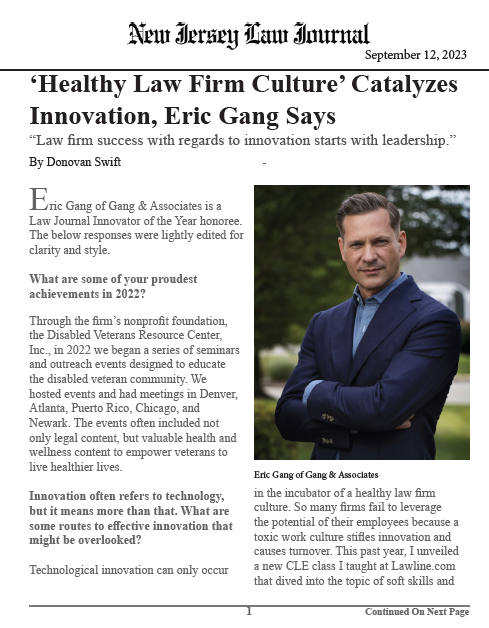Eric Gang of Gang & Associates is a Law Journal Innovator of the Year honoree. The below responses were lightly edited for clarity and style.
What are some of your proudest achievements in 2022?
Through the firm’s nonprofit foundation, the Disabled Veterans Resource Center, Inc., in 2022 we began a series of seminars and outreach events designed to educate the disabled veteran community. We hosted events and had meetings in Denver, Atlanta, Puerto Rico, Chicago, and Newark. The events often included not only legal content, but valuable health and wellness content to empower veterans to live healthier lives.
Innovation often refers to technology, but it means more than that. What are some routes to effective innovation that might be overlooked?
Technological innovation can only occur in the incubator of a healthy law firm culture. So many firms fail to leverage the potential of their employees because a toxic work culture stifles innovation and causes turnover. This past year, I unveiled a new CLE class I taught at Lawline.com that dived into the topic of soft skills and law firm culture. The premise was that the legal profession largely focuses on a hierarchy of skills that are not as important to clients, while ignoring the competencies that matter most to clients. Proficiency in the noncognitive skills may be a greater predicator of success in the legal profession, and as focus on these issues becomes part of the collective culture of the law firm, then innovation and competitive advantage can occur.
What must the leaders of law firms and other organizations do to ensure they are being receptive to new ideas, and to improve the legal profession’s reputation for being innovative?
Law firm success with regards to innovation starts with leadership. It is the leader and the leadership team of a law firm that can take intentional steps toward fostering a culture of innovation. It starts with clarity on the part of a leadership team, and then their ability to communicate that clarity relentlessly to their direct reports. It also means constructing the clarity around innovation into the human systems, such as hiring systems and performance management systems that can be designed to recruit and encourage creative/innovative employees.

